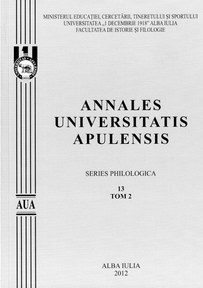Ficţionalizarea istoriei în „Jocul de smarald” de Ioan Petru Culianu
The Fictionalization of history in „The Emarald Game” by Ion Culianu
Author(s): Anca Ramona AndruşcăSubject(s): Literary Texts
Published by: Universitatea »1 Decembrie 1918« Alba Iulia
Keywords: historical novel; detective prose; re-reading; symbol; mystery; mind game
Summary/Abstract: Ioan Petru Culianu’s novel The Emerald Game, written in 1987, together with his associate and fiancé, Hillary Wiesner, belongs to the tendencies of today’s fiction of fading the differences between reality and fiction. Not being a direct contradiction of the ”official” version, this fiction reveals the ”dark areas” of history, suggesting a possible world, which cannot be verified. The only ”source” for the events is represented by an apocryphal document from the 15th century (Thomas Anglicus’ diary), found by the overt narrator of the text in the very luggage with which he left Romania in 1972 (the real date of Culianu’s definitive departure from the country). From the very beginning, the readers are notified that they have in front of their eyes an adapted and incomplete translation of the manuscript, in which the impression of a fictive game in the past is magnified. The atmosphere of the 1494 Tuscanian Renaissance is retraced through the overt narrator’s liberating confession in which he presents the moment of a radical change in history: the House of Medici is confronted to the decrease of power, the Neoplatonian Academy conducted by Marsilio Ficino experiences a severe crisis, and Florence, considered both a New Athens and a New Jerusalim, is threatened by the Puritan actions of a Dominican, named Savonarola, a dark preacher of Apocalypse. In this already tense context, a series of murders, committed under an astrological pattern, begins to appear They are mysteriously related to a painting of Sandro Botticelli’s La Primavera. This figura universi becomes the central symbol in the novel, and it is exposed to a continuous hermeneutic process, which does not solve the mystery, but rather emphasizes it.
Journal: Annales Universitatis Apulensis. Series Philologica
- Issue Year: 13/2012
- Issue No: 3
- Page Range: 7-16
- Page Count: 10
- Language: Romanian

